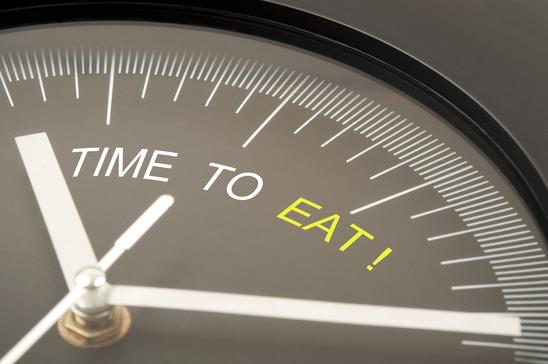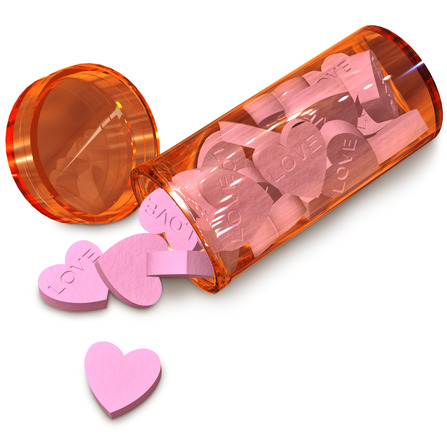The Importance of Eating Schedueles
|
Reading time: 6 minutes
|

Eat Right-On-Time for the Valentines
Tick tock. Valentine’s Day is nearly here. Time is passing, but do you really understand the worth of time at the moment? Here is a little something for all of you who are planning to surprise your lovers by shedding a few pounds. It’s time to whip out your checklist and check off your plans. Workout? Yes. Dieting? Yes. Eating at the right time? No, probably not. You haven’t been taking the time you eat into account for losing weight, have you? Let’s redefine the importance of ‘mealtime’ for you.
Did you know that besides advising athletes to work-out and eat right, trainers also strictly advise them on what time to eat a meal? Well, why? What is the difference between eating now, and eating then?
Researchers from Boston’s Brigham and Women’s Hospital, Tufts University, and the University of Murcia tested eating times on human beings and came to very interesting results. The research was conducted to study obesity, weight-loss, and its associated issues. For twenty weeks, 420 men and women with similar sleeping habits, diets, appetites, and hunger levels were studied. They were divided into groups of two: one group ate early in the day and the second group ate later in the day (after 3 o’clock in the afternoon). With both groups having similar exercise routines, at the end of the study, there were very interesting results. Early eaters lost about twenty two pounds of, while late eaters only managed to lose seventeen pounds. What’s more, late eaters exhibited sluggishness, tiredness, and low insulin levels which exposed them to risk of diabetes. More importantly, the late eaters were reported to shed weight at a slower rate than the early birds. What a bizarre connection between weight loss and time.
This study suggests that there is a certain cycle in our systems called a circadian clock. It is associated with our metabolism and sleep. According to researchers, eating late tampers with this clock, and tampering with the clock upsets our body systems and thus weight loss rate. Moreover, the research indicated that late sleepers have a more obesity prone diet routine than normal sleepers. For eating late means eating near bedtime, with no time to burn the fat.
So now you know how time may interfere with your perfect Valentine’s Day diet plan. It would be best to sketch out a rigid mealtime schedule. As per several nutritionists recommend, breakfast should be early and filling. Lunch, markedly early, should be filling as well, while dinner needs to be light and contain easily digestible foods. The reason being is that as the day progresses, the human body becomes more sluggish and thus fewer calories are burnt compared to the morning and afternoon. The human body needs time to burn calories and so dinner should be at least four hours before sleeping. A light snack, preferably fruits, can be taken after dinner.
Erratic food timings not only meddle with our calorie burning system but also with the insulin in our blood. What would be the use of dieting and exercising for your Valentine’s date when your own metabolism is slackening? So sleep well, eat well, and look fantastic for your Valentine.
Erectile Dysfunction: A Precursor to Heart Disease

Erectile dysfunction (ED), although may be a sensitive subject among men, can indicate your heart might not be as vivacious as it once was. Viagra might have saved you from some embarrassment in the bedroom but the problem extends much beyond the inability to have sex. Evidence suggests that erectile dysfunction, caused by depression, low testosterone, nerve problems and some medications, can actually be a precursor to heart disease.
Reason behind Erectile Dysfunction
Perhaps the most common cause of erectile dysfunction is atherosclerosis. Atherosclerosis involves the incapability of blood vessels to dilate properly as a result of cholesterol buildup. High levels of cholesterol in the bloodstream causes a deposit in the blood vessels, narrowing them and constricting blood flow. At one point, blood flow is completely obstructed leading to a heart attack.
Since atherosclerosis does not only affect the blood vessels to the heart but also the intertwined vessels throughout the rest of the body, it can be considered as the likely cause of erectile dysfunction. Usually, atherosclerosis initially affects the penis first and then moves on to the heart, brain and finally the legs. Thus, ED can be clearly taken as a red flag for heart attack or strokes later on in life.
Study Proves Canary in the Trousers
A population-based study conducted by Australian Public Library of Science (PLOS) related to men aged 45 and over in New South Wales revealed that men suffering from erectile dysfunction faced increased risks of heart disease, vascular disease and even death than their non-ED counterparts. Even more staggering is that about 2300 men from the sample actually lost in a heart battle at the end of the study period.
Emily Banks, a researcher from the study, notes that the more severe the erectile dysfunction is, the higher the chance of heart disease and premature death. Moreover, one in five men above 40 is likely to suffer from moderate or severe erectile dysfunction.
According to Dr. Kevin Billups, director of Johns Hopkins Hospital’s Integrative Men’s Health Program, the arteries in the penis tend to be much smaller than arteries that supply blood to the heart and brain and therefore get blocked faster. Moreover, this sensitive organ is capable of signaling an oncoming heart disease risks such as oxidative stress and inflammation.
More than Viagra for ED
Aging is more than grey strands of hair; you have to take care of risk factors and control your behaviors. It is simply not the time to smoke passively, eat unhealthy, and let your blood pressure loose. These can lead to cholesterol blockages in the penis and can eventually strain your heart muscles. So if you are suffering from sexual anxiety and rely on Viagra, with a waist above 40 inches and frequent blood pressure problems, you might want to just drop in at your health care clinic to see if your good old heart is beating at its best. Work hard and lead a healthy active life!
Information provided on this website is for general purposes only. It is not intended to take the place of advice from your practitioner







